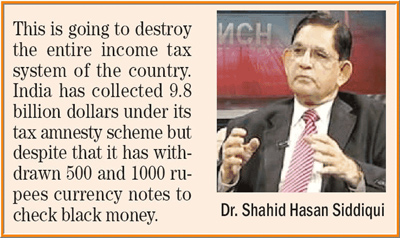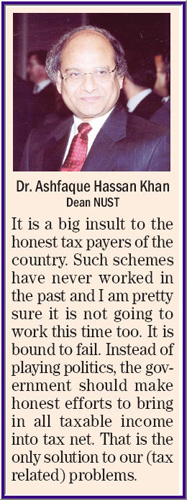FOCUS
The Pakistan Muslim League-Nawaz (PML-N) government is introducing a tax amnesty for the real estate sector to entice property dealers to voluntarily join the tax net but critics say the scheme would serve as a big booster for back money businesses and encourage tax evasion.
 The National Assembly last week approved the open-ended scheme that allows the real estate businessmen to legalize large chunk of their investment by surrendering just three percent of it to the government without revealing the source of their money.
The National Assembly last week approved the open-ended scheme that allows the real estate businessmen to legalize large chunk of their investment by surrendering just three percent of it to the government without revealing the source of their money.
The lower house of the parliament approved the legislation – Income Tax Amendment Bill 2016 – despite opposition of the Federal Bureau of Revenue (FBR) and its chairman just a few days back told the National Assembly’s Standing Committee on Finance and Revenue that no such scheme is under consideration.
The bill has yet to be passed by the Senate and the government may face difficulties in pushing it through there as it lacks majority in the  Senate but if it is passed, it is estimated to whiten seven trillion rupees invested in the real estate sector.
Senate but if it is passed, it is estimated to whiten seven trillion rupees invested in the real estate sector.
The scheme is not time-bound and realty sector agents could take benefit from it any time by paying just paltry sum.
Under the existing income tax laws, the maximum tax rate for individuals is 35 percent and 100 percent penalty is imposed in case of late payment. But under the proposed new scheme, only three percent would be paid.
“It is a big insult to the honest tax payers of the country,” Dr. Ashfaque Hassan Khan, the former advisor of the finance ministry and a long-time critique of the government said.
The PML-N government has launched three amnesty schemes during its current stint in power and experts wonder that why did government launch the latest scheme when it failed to get desired results from the earlier schemes.
“Such schemes have never worked in the past and I am pretty sure it is not going to work this time too. It is bound to fail,” Khan said.
Successive governments in Pakistan have launched many tax amnesty schemes in the past which are mostly politically-motivated moves.
It is not just political and civilian governments which had introduced such schemes to allow black money to be widened to appease powerful political lobbies but the military regimes too have tried such schemes in an effort to build political base for them.
In total ten tax amnesty schemes have been introduced in Pakistan, so far, which included 1958 Tax Amnesty Scheme by Ayub Khan, 1968 Tax Amnesty scheme of Yahya Khan, Zulfiqar Ali Bhutto scheme as well as those introduced by the political governments in the 1990s and by Musharraf-led government.
Analysts say the PML-N government seems to have launched the recent scheme without doing proper homework and that was why the FBR boss has shown his ignorance a few days before its launch.
 Interestingly, a couple of weeks before the passage of the bill in the National Assembly, Haroon Akhtar Khan, Special Assistant to the
Interestingly, a couple of weeks before the passage of the bill in the National Assembly, Haroon Akhtar Khan, Special Assistant to the  Prime Minister on Revenue, is reported to have opposed tax amnesty for the realty sector.
Prime Minister on Revenue, is reported to have opposed tax amnesty for the realty sector.
He reportedly said the government plans to bring real estate into tax net and the government would not allow this sector to be a “safe haven” for black money.
Dr. IKram ul Haq, a prominent lawyer and tax expert, said property speculators and affluent real estate mafia would rule the roost if the proposed bill was passed by the Senate and ultimately signed into law by the president.
“It is lamentable situation where the entire state apparatus (becomes) subservient to those who blatantly manage to hide their incomes and wealth,” he said.
“It is an ugly joke with those who are paying their taxes honestly at much higher rates than those offered to tax evaders in amnesty.”
The experts say the real estate sector is one the most lucrative businesses in Pakistan and people earning dirty money would be more than happy to put in their ill-gotten wealth in this sector by paying off a small amount to government.
“This is going to destroy the entire income tax system of the country,” senior economist Dr. Shahid Hasan Siddiqui said.
Haq said the PML-government should have learnt the lesson from the fate of its previous such schemes before introducing the new one.
He said the present government could fetch a negligible amount of 88 million rupees under its tax amnesty scheme in 2013.
He said under the much publicized voluntary tax amnesty for traders, the government could lure only over 3000 traders to pay tax despite extension of the deadlines several times.
Analysts say Pakistan’s track-record of tax amnesty schemes showed that the government launched such schemes under the influence of powerful lobbies who promise to join the tax net during the scheme but they back away from their promises once these programs are launched.
They cite the example of tax amnesty schemes launched by the present government in 2013 after protracted negotiations with traders but at the end the government has to bite the dust when traders backed off from their commitments.
Moreover, they say such schemes lack innovative ideas to attract people to avail these concessions and do not stipulate any stringent penalty for those who fail to reveal their wealth under these schemes.
For example, they said the Indian government recently introduced an amnesty under which hoarders of un taxed wealth could keep only half of their money by declaring it to the government.
Moreover, those availing this scheme were supposed to deposit one quarter of their untaxed money into a government fund to be spent on the welfare of the poor of the country and depositors are allowed to get back this amount but after four years.
The Indian government warned that anyone failing to declare his assets under this scheme would be made to surrender 85 percent of his wealth if he is caught hoarding such money.
But just a few weeks after this scheme, the Indian government launched the demonetization program in a major crackdown on money laundering and black money.
“India has collected 9.8 billion dollars under its tax amnesty scheme but despite that it has withdrawn 500 and 1000 rupees currency notes to check black money,” Siddiqui said.
In Pakistan, critics say ill-gotten money hoarders have taken tax amnesty schemes as a sign of weakness of the governments and have never taken such moves seriously.
Therefore, they believe that the rulers should focus their attention in introducing much-needed reforms to make taxation system more effective instead of wasting resources and time on ill-conceived schemes.
“Instead of playing politics, the government should make honest efforts to bring in all taxable income into tax net. That is the only solution to our (tax related) problems,” Khan said.
The writer is a senior journalist based in Islamabad